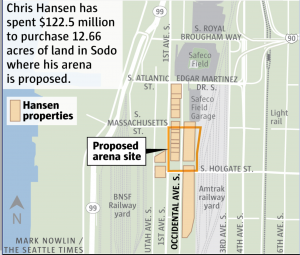It has been 9 years since Seattle has had a professional men’s basketball team (Seattle Sonics) and 42 years since the city possessed an NHL franchise (Seattle Totems). The fan base in Seattle has been desperate for either sport, specifically basketball, to be part of the city once again. For any team to come to Seattle, an arena has to be built (or renovated). Gary Bettman, commissioner of the NHL stated back in 2015 the issue for Seattle as a city.
“No one has their arena act together yet in Seattle.”
It’s quite true that no conclusion has been made on what arena project to move forward within Seattle, but not from lack of effort. Chris Hansen, a hedge-fund manager, has offered to fully privately finance the arena, and having already bought the land to build it, it has been restricted by one street in Seattle called Occidental Avenue. Hansen needs Occidental to be vacated to build the arena and after a Seattle City Council vote last year, it was not approved. This lack of approval was largely driven by the Port of Seattle. The Port has argued that the vacation of Occidental would increase traffic overall around the SoDo area and therefore hurt the efficiency of the Port’s business. It completely set back the project, and recently since Hansen has offered to fully fund the arena for $500 million, he has requested a new vote on the vacation of Occidental. Check out this neat graphic from the Seattle Times below:
Previously, in the Memorandum of Understanding (MOU) that Hansen had signed with the City in 2012, Hansen was supposed to be given $200 million in public bonds if the team was received by November of this year. After the vote was against the vacation of the street, Hansen decided to fully fund the project–an unprecedented move in major sports buildings across the country. Nearly all of the stadiums and arenas around the country are publicly funded–the fact that Hansen was even offering to privately fund most of the project was remarkable. Hansen is forgoing the MOU now and is allowed to work within whatever time he needs to build the arena and acquire a team for the city of Seattle. However, there is the option to renovate the KeyArena, the previous house for the Sonics and current home of the Seattle Storm, the women’s professional basketball team in Seattle. There are multiple competitors for the renovation of the building as it would be an alternate for what Hansen is trying to do.
A company in Los Angeles called the Oak View Group is led by former executive of the Seahawks Tim Leiweke. He is a supporter in moving forward with KeyArena as not only a NBA but also a NHL arena. He is even interested in a relevant entertainment option as well. The Seattle Times interviewed Leiweke about the possibility.
“We believe that the studies have proven — and we will continue to do additional studies as we go through this process — that there is a chance to renovate and make that arena work for music and sports…and the economics are such that if the right private-public partnership can be established, that it will stand alone on its own two feet without the rest of the land around it having to be developed.”
A study last year from AECOM found that the renovation would cost around $285 million and Leiweke seems to be ok with taking that kind of finances on.
“We understand that the private sector is going to have to do the heavy lifting here,” Leiweke said. “The private sector is going to have to take the risk here. The private sector is going to have to operate it here. We get that.”
The other important point in this matter is how Adam Silver feels about the KeyArena option. About a year ago he said this as highlighted in a Seattle Times article:
“For me, it’s a fresh start. Nothing’s a closed deal,’’ Silver said of a KeyArena renovation option. “Especially with what an arena renovation looks like these days compared to the old days. It’s very different. And so, when somebody talks about renovating KeyArena — depending on how much was invested — it could look just like a new arena, frankly.”
Adam Silver’s role moving forward in bringing a team back to Seattle is vital, obviously. The fact that he doesn’t seem to write off KeyArena as a possibility is very important as other groups have become more eager to move forward in building any arena. Moreover, another point to outline is that on Wednesday, Mar. 29 it was found that the Port would be putting $185,000 into supporting the KeyArena and ridding the SoDo arena that Hansen is trying to build. Even more so, Mayor Ed Murray has not necessarily supported Hansen’s arena. This is extremely detrimental as his opposition could influence and have an impact on Seattle City Councilmembers vote for the vacation of Occidental. Additionally, another group called AEG, the company that handles marketing for KeyArena is interested in renovating the arena.
This is a lot of information to process, and is obviously extremely complicated as building arenas go but I ask you to think about what possibility makes the most sense–not politically but economically

